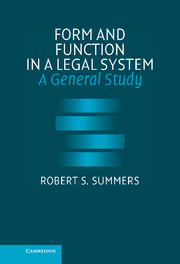Book contents
- Frontmatter
- Contents
- Preface
- Acknowledgments
- PART ONE INTRODUCTION, BASIC CONCEPTS AND DEFINITIONS, AND A GENERAL APPROACH
- PART TWO THE FORMS OF FUNCTIONAL LEGAL UNITS
- 4 Forms of Institutions – Legislative
- 5 Forms of Precepts – Rules
- 6 Form and Content within a Rule – Continued
- 7 Forms of Nonpreceptual Law – Contracts and Related Property Interests
- 8 Forms of Legal Methodologies – Statutory Interpretation
- 9 Forms of Sanctions and Remedies
- PART THREE THE OVERALL FORM OF A LEGAL SYSTEM AND ITS OPERATION
- Name Index
- Subject Index
8 - Forms of Legal Methodologies – Statutory Interpretation
Published online by Cambridge University Press: 29 July 2009
- Frontmatter
- Contents
- Preface
- Acknowledgments
- PART ONE INTRODUCTION, BASIC CONCEPTS AND DEFINITIONS, AND A GENERAL APPROACH
- PART TWO THE FORMS OF FUNCTIONAL LEGAL UNITS
- 4 Forms of Institutions – Legislative
- 5 Forms of Precepts – Rules
- 6 Form and Content within a Rule – Continued
- 7 Forms of Nonpreceptual Law – Contracts and Related Property Interests
- 8 Forms of Legal Methodologies – Statutory Interpretation
- 9 Forms of Sanctions and Remedies
- PART THREE THE OVERALL FORM OF A LEGAL SYSTEM AND ITS OPERATION
- Name Index
- Subject Index
Summary
“[T]he words used, even in their literal sense, are the primary, and ordinarily the most reliable, source of interpreting the meaning… .”
– L. Hand“There is no surer guide in the interpretation of a statute than its purpose when that is sufficiently disclosed… .”
– L. HandINTRODUCTION
A legal methodology may be defined as a systematic general approach to the duly purposive and consistent execution of a recurrent type of major task arising in the making or application of law. A methodology is thus a special type of functional legal unit. A legislature may adopt tenets of a methodology more or less all at once or a highest court may evolve tenets of a methodology case by case over time. A methodology may not be fully developed in a jurisdiction at a given time.
In many jurisdictions within developed Western systems, generally authoritative methodologies are recognized in some measure for the duly purposive and consistent execution of at least the following major types of tasks: interpreting statutes, interpreting contracts, and interpreting written constitutions. Methodologies may also exist for the application of case-law precedent, and for the drafting of statutes, and of contracts.
The use of a methodology for the duly purposive and consistent execution of a major and recurrent type of task arising in the making or application of law is to be contrasted with purported execution of such a task without resort to any methodology.
- Type
- Chapter
- Information
- Form and Function in a Legal SystemA General Study, pp. 241 - 282Publisher: Cambridge University PressPrint publication year: 2005

